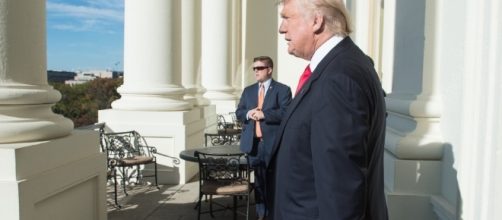It's done: president-Elect Donald J. Trump is now President Trump. It begins. Among stony looks from the likes of the Clintons, Ted Cruz, and Bernie Sanders, Trump took the Oath of Office, officially becoming President of the United States at midday in Washington, D.C. If people were expecting disruptive drama, they didn't get it. But we got a hell of a speech.
Trump takes control of a divided country
What we hear about so much these days is just how divided the United States has become, with the results of a bitter campaign being the election of Donald Trump through the Electoral Collage but a loss by millions of the popular vote.This has clearly bothered Trump, and negative emotions have been running so high that we've had riots and poorly-conceived claims of Russian hacking, often by people who seem to have forgotten Clinton's own dodgy win of the Democratic nomination.
There's no denying that the country needs to mend divisions that have been given vitriolic life by people across the political spectrum. Did his speech help or harm matters?
Trump delivers bracing speech about those in power
Many hoped Trump would aim for a unifying speech. What we got was a mix: Trump called for unity, but also delivered scathing barbs to his opponents – many who were sharing a stage with him. It felt much like his campaign speeches but tuned more to the key of 'We': he focussed less on Donald Trump and more on the people.
Those hoping for reconciliation didn't get much. After expressing gratitude to the Obamas and calling them “magnificent,” Trump launched into a speech filled with references to the dire plights of many American families who have lost income and power as factories and jobs disappeared across the nation – and placed the blame squarely on the establishment.
There was little sugar-coating in the speech. But that's what got him where he is. Would he have been amiss not to have thrown in some disrespect?
Trump emphasizes power to the people – and unity
Further emphasis was then placed on American unity: “What truly matters is not what party controls our government, but whether our government is controlled by the people ... A new national pride will stir our souls, lift our sights, and heal our divisions... Whether we are black or brown or white, we all bleed the same red blood of patriots.”
Will Trump engage in bipartisanship?
If the party in control of the government doesn't matter, can we expect Trump to engage in more bipartisan measures?Trump's criticisms of the establishment takes aim at people in his own party.
The blame for any problems in America must fall at the feet of Republicans in Congress, too.
Trump hasn't pandered much to the big names in his own party – and many of his comments on trade, infrastructure, and foreign policies mirrored that of the Democrats - which is why so many conservatives, usually the lifeblood of the Republican party, have rejected him. There remained no pandering in this speech.
With this in mind, it's possible we will begin to see more bipartisanship from the President in the coming months. The nature of campaigns is that they emphasize divisions that will always exist in America. But post-campaign mode, Presidents have been known to engage frequently with the Presidents who came before them.
Kennedy and Eisenhower were known to have spoken at length on many issues during Kennedy's presidency, especially regarding the Bay of Pigs disaster. To what extent can we expect Trump and Obama to converse on issues?
Trump's road to recovery?
Though Trump didn't spend a lot of time focussing on it in the speech, we are seeing some positive gains in the United States. Housing is beginning to boom again, the car industry is soaring – recovery is underway.
The inauguration ceremony continues. It's a ceremony that is meant to celebrate not the victory of the elected President, but of what that election represents: American democracy. Thankfully, for all its muted hostility, Trump's speech ultimately fit this tradition.

